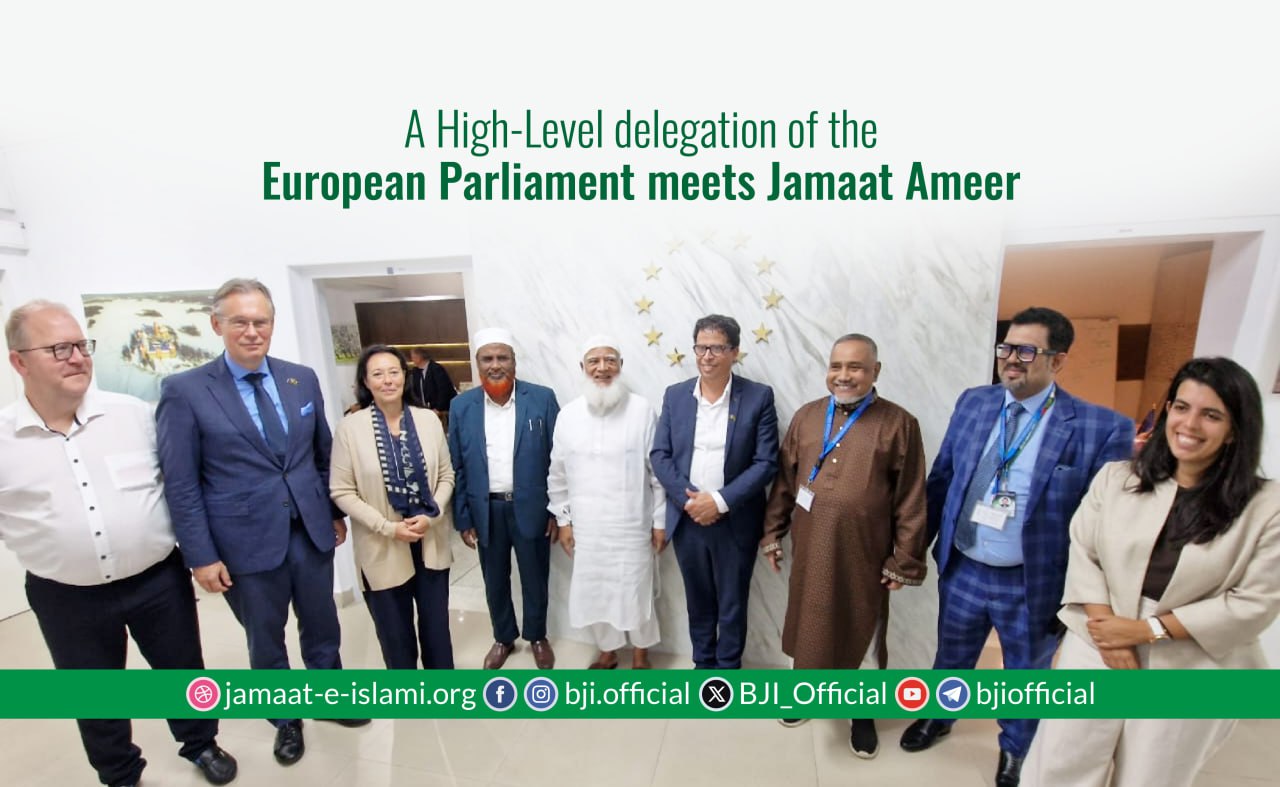
On 16 September (Tuesday) at 4:00 pm, a four-member delegation of Bangladesh Jamaat-e-Islami, led by Bangladesh Jamaat-e-Islami's Ameer Dr. Shafiqur Rahman held an important meeting with a high-level delegation of the European Parliament at the European Union Embassy in Dhaka. Nayeb-e-Ameer of Bangladesh Jamaat-e-Islami and former MP Dr. Syed Abdullah Mohammad Taher, Secretary General and former MP Professor Mia Golam Porwar, and Jamaat Ameer’s Foreign Affairs Advisor Professor Dr. Mahmudul Hasan accompanied the Jamaat Ameer.
The delegation of the European Parliament included Mounir Satouri (Chair of the delegation), Isabel Wiseler-Lima from Luxembourg (EPP), Arkadiusz Mularczyk from Poland (ECR), Urmas Paet from Estonia (Renew Europe), Catarina Vieira from the Netherlands (The Greens), along with several others.
At a short press briefing after the meeting, Nayeb-e-Ameer and former MP Dr. Syed Abdullah Mohammad Taher said, “We had a very cordial discussion with them. The current situation of Bangladesh was discussed. The matter of the upcoming February elections was discussed as well specially whether the elections will be fair, and how it will be conducted. These were mainly their points of interest.”
He further said, “After 54 years, a special opportunity for change is coming to Bangladesh. All political parties are united and sincerely aware of utilizing this opportunity to bring the necessary change in Bangladesh. This government had given commitments—that they would carry out reforms, ensure visible justice, and arrange for a free and fair election, which we believe to be a truly free and fair election.”
He continued, “You know the government formed an NCC (National Consensus Commission). There, we reached consensus on many important issues. This has brought about significant development in Bangladesh and created a friendly atmosphere among political parties. But now, the problem is—how the agreed issues will be implemented. Some differences have emerged over the implementation process. You know that 31 parties participated in the dialogue. Among them, 26 parties supported the PR (Proportional Representation) system, which included Islamist, rightist, and leftist parties. But there was one difference—some parties want PR only in the Upper House, while some want PR in both the Upper and Lower Houses. We, Jamaat-e-Islami, are demanding PR in both Houses. Our reasoning is that in the past 54 years, elections under the traditional system have not been fair. As for the last 15 years, there is no need to even mention the three elections that were held.”
He said: “The culture, mentality, and strategies of political parties—whereby they seize polling centers by force to become MPs and assume power—must be changed urgently. Because despite so much experience, despite so many killings, despite shedding so much blood, we see very little change in mindset. The clearest proof of this was seen in the recently held DUCSU and JUCSU elections. Those elections were very fair, and voting continued until 4 p.m. But then they boycotted. When they realized they would lose, they declared they would not accept the election. This proves that they do not like fair elections. In JUCSU’s case, we saw delays of more than 72 hours in declaring the results. Because everything was in public view, they could not reverse the results. But the attitude of overturning results still exists. We fear the same may happen in the national election.”
“That is why we said: if the PR system is adopted, no single candidate will stand in a constituency, and therefore the interest in capturing centers with money will disappear. For this reason, we want at least one election to be held under the PR system on a trial basis. If it does not work well, it can be changed next time. That is why we are demanding PR in both houses. Most people are in favor of PR. The visiting delegation also said that in most of their countries, the PR system is in place. They easily understood our point.”
In response to a journalist’s question, Dr. Taher said: “I do not think that extending the duration (of the NCC talks) will help to reach consensus. One hour is enough to reach consensus. Still, the time was extended. There could be two reasons for this: maybe sincerely they hoped something more might emerge. But I doubt it. Whatever was to come out has already come out. The rest depends on the will and decisions of the parties. Those who do not want reforms, who do not want a legal framework, and who do not want the next election to be held on that basis—essentially they are creating the problem now. If this attitude does not change, then not only one month, but even if the term extends until after the election, nothing will happen. I fear this is just a tactic to delay time. People are now beginning to feel the same way.”
In response to another question, Jamaat's Nayeb-e-Ameer said:
“We have already been working with the Consensus Commission for two to three months, and we have already reached agreement. Therefore, giving it legal recognition is simply a matter of decision. Otherwise, we will see that after moving in circles for a month, we are still standing in the same place.
He further said: “We did not say that we will not participate in the election. We believe that the PR system is the best, and that is our demand. We are presenting arguments and trying to explain. We hope our arguments will be accepted, and on that basis, we will participate in the election.”
“We are demanding PR in both the upper and lower houses. And this issue can be resolved at the discussion table. We are in favor of going to the table for talks and in favor of dialogue. But this requires an open mind and a spirit of neutrality.”
